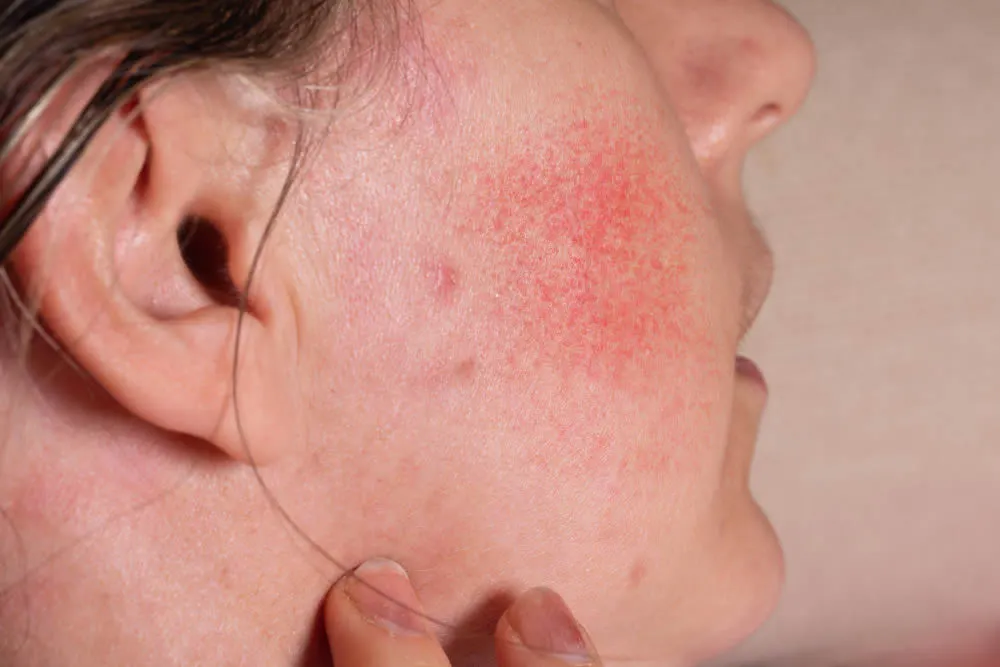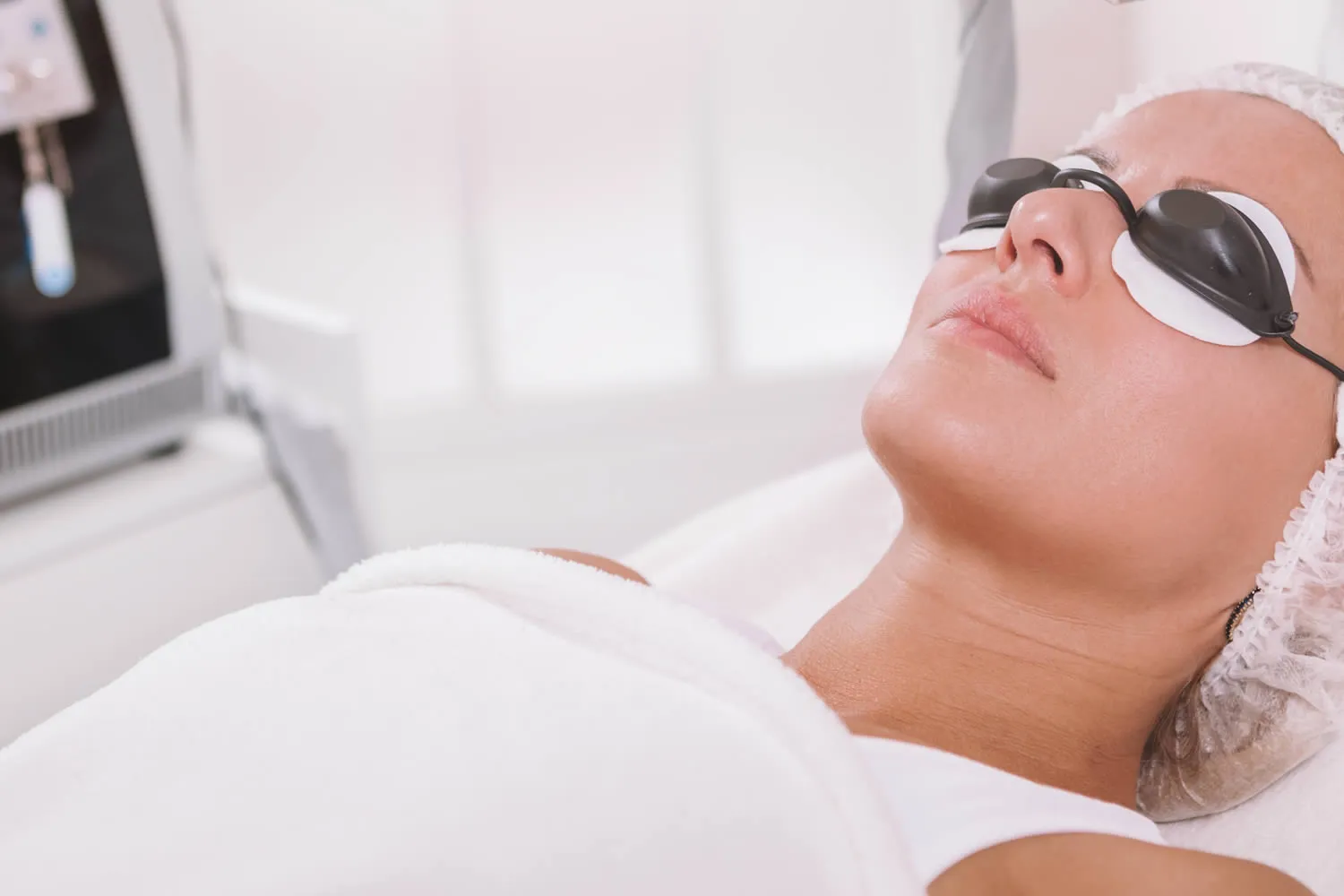What is a V-Beam Laser?
The V-Beam laser, an FDA-approved device, utilizes pulsed dye laser technology, which uses a dye to generate beams of various colors delivered in pulses. Often referred to as a vascular laser, it is particularly effective in treating dilated blood vessels, a common characteristic of conditions like rosacea. The V-Beam emits a yellow light, making it safe and effective for many skin types. This specialized laser targets the hemoglobin in the blood vessels, generating heat that damages the vessel walls and causes them to shrink and eventually disappear, leaving the surrounding tissues unaffected.

How does this treatment work?
V-Beam treatments utilize the V-Beam laser system to produce an intense burst of light that selectively targets and destroys the blood vessels of vascular lesions without damaging the surrounding skin and tissue. This is because the laser is tuned to a frequency that can be absorbed by your blood vessels but not by your skin.
During the treatment, you will be seated or lying down, depending on the area being treated, and special protective glasses will be provided to shield your eyes from the laser light. The laser specialist will then calibrate the laser according to your unique needs. A small handpiece is then placed against your skin, which delivers short bursts of energy along with a cooling spray between each pulse of the laser. This process helps to minimize discomfort and protect the skin during the treatment.
As the laser heats the blood vessels, they coagulate and are slowly absorbed by your body through its natural healing process. This leads to the reduction or elimination of the appearance of vascular lesions. The treatment typically lasts 15 to 20 minutes, making it a relatively quick and minimally invasive option for treating various vascular skin conditions.
What issues can V-Beam Laser treat?
The V-Beam laser is a versatile treatment option that can address a variety of vascular skin conditions, helping to reduce or even eliminate the appearance of pink and red spots and patches on the skin. It is particularly effective in treating the redness and flushing associated with rosacea, making it the primary treatment option for this condition.
In addition to rosacea, the V-Beam laser can also be used to treat the following conditions:
- Spider veins: Small, damaged veins that appear on the skin’s surface.
- Port-wine stains: A type of birthmark that is a red or purple skin discoloration.
- Facial veins: Visible veins that appear on the skin’s surface on the face.
- Scars: The V-Beam laser can help reduce the redness associated with scars.
- Red birthmarks: Vascular birthmarks that are red.
- Poikiloderma: A skin condition that causes redness and pigmentation on the neck.
- Angiomas: Benign tumors formed by a collection of blood vessels.
- Venous lakes: Blue lesions that typically appear on the lip.
- Warts: Growths on the skin caused by the human papillomavirus (HPV).
By targeting and damaging the blood vessels associated with these conditions, the V-Beam laser promotes the body’s natural healing process, leading to the reduction or elimination of the appearance of these vascular skin issues.
When will the results of the V-Beam be visible?
The results of the V-Beam laser treatment can often be seen immediately after the first session, although the final results will depend on the number of treatment sessions undergone. For maximum results, it is generally recommended to have 3 to 5 sessions spaced a month apart.
In many cases, the results of the V-Beam treatment will be permanent, as the areas treated will lighten up considerably and may even disappear completely. However, it is important to note that some conditions may recur, so it is always advisable to have a follow-up consultation with your healthcare provider to assess the long-term results and determine if any additional treatments are necessary.
Post-treatment care after V-Beam Laser
After undergoing V-Beam laser treatment, several important aftercare steps should be followed to ensure the best possible results and minimize adverse effects.
- Avoid Heat: For two days after the treatment, avoid activities that cause excessive heat, such as using saunas, hot tubs, and Jacuzzis.
- Use Non-Irritating Skin Care Products: For two weeks following the procedure, using only non-irritating and non-clogging skin-care products is important. Scrubs, toners, glycolic acid, retinoids, and bleaching creams should be avoided as they could adversely affect your results.
- Sun Protection: Applying sunscreen every time you go outside for at least three months after your treatment is critical. Use a broad-spectrum sunscreen with an SPF of 30 or higher. Apply it 20 minutes before going outside and reapply it every two hours. Wearing a wide-brimmed hat can also help protect your skin from the sun.
Following these aftercare guidelines will help optimize your V-Beam laser treatment results and minimize the risk of any adverse effects.

FAQ About V-Beam Laser
What areas can V-Beam treat?
V-Beam can treat various areas of the body, including the face, neck, chest, legs, and back. It is effective in treating vascular skin conditions such as rosacea, facial veins, spider veins, angiomas, venous lakes, scars, red birthmarks, poikiloderma on the neck, and warts.
Is there any downtime after the V-Beam Laser treatment?
There is minimal to no downtime after the V-Beam laser treatment. Most patients can return to their normal activities immediately after the session, although it is recommended to avoid excessive heat and sun exposure for a few days following the treatment.
Is the V-Beam Laser treatment painful?
The V-Beam laser treatment involves minimal discomfort as a cooling spray is applied between each pulse of the laser to protect the skin and minimize discomfort. However, some patients may experience a mild stinging or snapping sensation during the treatment.
How many V-Beam Laser treatments will I need?
The number of treatments required will vary depending on the individual and the severity of the condition being treated. However, most patients achieve optimal results with 3 to 5 sessions spaced a month apart.
Is there a dermatologist near me in Raleigh that offers V-Beam Laser treatment?
Yes. At our Raleigh dermatology office we offer V-Beam Laser treatment to patients from Raleigh and the surrounding area. Contact our office today to schedule an appointment.

